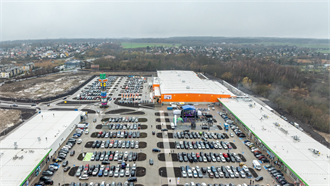Amid all the hype about proptech and its impact, four leading property firms discussed how they are actually using technology during a panel discussion hosted by PropertyEU at Provada in Amsterdam.
The property industry as a whole may have been a bit slower to adapt to technology advancement compared to other fields ending with ‘tech’.
But that mantra does not hold for every player, for sure. Perhaps more accurately, proptech is still nascent and while it collapses verticals all around it, analogue providers of space are being challenged to embrace or potentially wither.
That much was clear from a debate hosted recently by PropertyEU. Held in June at trade show Provada in Amsterdam, Johnnie Sims, Client Services Director of Coyote Software; Robbert Heekelaar, VP, IT Architecture & Emerging Technologies at Prologis; Kingma Ma, VC Investor at Round Hill Ventures, and Ed Bouterse, entrepreneur & Head of Workthere Netherlands, gave a live discussion on the proptech scene.
And, rather than focussing on the over-narrated story that property is behind other industries, the superseding debate was: ‘how are real estate firms using technology?’
Shift to services
San Francisco-headquartered logistics firm Prologis started to think about technology some years ago. Heekelaar said the company’s CEO (Hamid Moghadam) began challenging the company to pivot from a one-dimensional provider of ‘four walls and a roof’ to being more service-orientated. ‘We started to think how we could help our customers, leveraging our skills and knowledge and we did that in multiple ways,’ explained Heekelaar. ‘We began to invest in start-ups that are interesting for the future and for our business.
‘And we set up Prologis Labs. That is our playground where we invite start-ups and customers to test and break stuff. For us, that is a huge step because we are moving from being a standard real estate company into being service-orientated and more tech-minded. And we are still in that process because it is a journey.’
Workthere, like Prologis Labs, is also a start-up, just two years into its journey. But it is part of long-established property services company, Savills plc. Workthere was established in 2017 by a Savills graduate who saw a chance for the company to provide a platform for those seeking flexible office space. It has already built up over 650 flexible office locations on its portal. The information is uploaded for free, and Workthere charges a percentage of rent if the tenant comes to the operator via the Workthere platform.
This company is managing to expand cross border – not always an easy thing to do for proptech companies if their USP is heavily dependent upon local knowledge and its network, as some panellists discussed.
Workthere already operates across multiple European locations as well as in the US and Asia, and is looking to expand further into these areas. ‘We are trying to get as much coverage as possible in different countries,’ said Bouterse. ‘Our clients are in the US, India, Spain and so on, and Workthere is developing to get the globe onto the platform.’
Software company Coyote is another example of how property companies have been using technology.
Sims explained how private real estate investment firm M7 Real Estate, which was started in 2009, was essentially forced to build an in-house system to deal with issues arising from being an ambitious, fast-growing company. Coyote began as a conflict checker to handle all the deal introductions it received, and grew from there. It is led by its developer CEO, Oli Farago.
Rather than creating some software and seeing if it sells, Sims explained Coyote asks clients, ‘Where are the pain points?’. Once it determines what is man-hour heavy, Coyote sees about how it can get features working together to expedite repetitive processes and improve efficiency and sharing of information.
Collapsing asset verticals
Pidgeon-holing proptech products is a challenge in itself sometimes. Among helpful guides is the book ‘Proptech 101’ written by Aaron Block and Zach Aarons of venture capital firm MetaProp NYC. It says proptech start-ups can be conceptually categorised by assessing where they are in the real estate value chain. In the so-called ‘dirt to disposition’ spectrum, a proptech firm might be pitching itself at the start of the value chain by dealing with analysis and financing (zoning, appraisal, budgeting and modelling). Or maybe it is one notch along the spectrum because it deals with space. Further along it could be something helping diligence, and later still, development & construction, process automation (sales, leasing, underwriting, broker tools), space usage and management (which includes facilities management), and then finally payment services at the right hand side of the spectrum (rental, utilities etc).
This shows how wide the proptech scene is, but one can fit virtually anything into it from 3D printing of construction elements and robotic brick laying, to care home and student housing apps and asset management software. Speaking of the array of different proptech startups out there, Round Hill Ventures’ Ma said: ‘Proptech is an extremely broad term.’
Round Hill Ventures, which itself is just two-and-half years old having been incubated by property firm Round Hill Capital, has invested in around 14 start ups to-date. Later this year it will be raising what could become Europe’s biggest proptech venture capital fund.
‘The way we see proptech as a term is as something that can applied to any technology business that has a large real estate component to it,’ explained Ma. ‘It doesn’t mean it necessarily has to be IoT sensors that one places in buildings, or a building management system. It could also be a whole new way to design a school or a gym or a hospital that requires an optimal location to operate efficiently.’
Cloud kitchens
Ma added: ‘We see interesting developments everywhere. The emergence of cloud kitchens (note to readers: food takeaway outlets that function as no dine-in production units, also known as “dark kitchens” or “ghost kitchens”) is becoming much talked about. You see it with larger investors like Softbank Investment Advisers heavily investing in this area. Essentially, companies like these are the “Apples” of the real estate industry. Some are fundamentally property managers disrupting businesses, coming out with whole new ways to collect information, market and brand themselves.’
Said Ma: ‘Companies such as WeWork were just the start of this. We think there is going to be a whole new range of different verticals for entrepreneurs to tap into and work with the real estate industry, which is a really exciting change.’
Given the proptech industry is in its infancy, it seems few people are talking about it let alone pinpointing the formation of any bubbles. The IPOs of WeWork and Airbnb will ensure publicly disclosed information about valuations of such companies. As a VC firm, Round Hill Capital looks at very early stage businesses from technologies for modular housing solutions for manufacturing, design and installation of buildings to data management software products. ‘But fundamentally,’ explained Ma, ‘what we care most about is the user experience.’
‘What does that mean? Harnessing technology that makes the objective of the end-user easier, smarter, faster. From a personal point of view, to me the most exciting companies are the most ambitious ones that have a very practical game plan in order to scale. Fundamentally we are talking to more companies that are about collaboration than disruption.’
Prologis’ Heekelaar said luckily Prologis had quite a visionary CEO who a few years back was quoted by Bloomberg as saying: ‘shame on us if we can’t turn this into a big information company’.
‘So, we started to run with that, building a data environment,’ Heekelaar said. Relevant data encompasses aspects such as tracking where goods are, what the quantity is, when they are due to arrive, and how long they must await pick up and onward distribution. Smart buildings and whole networks of buildings are big wins.
Pop-up labs
As previously explained, Prologis actually backs start-ups and helps them navigate cross-border challenges using its knowledge and footprint in around 12 European countries. Heekelaar also highlighted an exciting potential development as Prologis Labs looks to come to Europe from California.
‘We have a physical lab in San Leandro in California. What we are going to do is what we call pop-up labs in different parts of the world. So, let’s start with Europe,’ said Heekelaar. ‘If we have good customer engagement and a really great experiment with a customer, we will make sure we have the space to run that experiment for say three, four, or five months. Most of our customers are so fully equipped, they are stuffed, and they cannot do all these innovations themselves. So, we are going to give them the pop-up labs to start testing things out and we are both going to learn from these experiments. That’s where we’re heading to.’
But he also observed there are so many ‘end-to-end’ or vertical solutions in the wide field of proptech such as IoT. If one thinks bigger and wants an entirely smart warehouse or a smart network of multiple warehouses, one can end up with 20 apps! ‘Then you want to combine and extract all the information if that is possible under data ownership. So, the apps can become useless because you have to build one yourself.’
Technological advances are taking place at Coyote and Workthere as well although of course in different ways. For instance, to further enhance its platform Workthere is developing something that it prefers to keep under wraps for the moment so as not to alert any competition. It comes down to Workthere enhancing the digital experience of touring properties. ‘We think that when you have the best user experience, people will buy from you,’ Bouterse said.
Predicting the future
For Coyote, being a ‘client-driven’ software solutions firm means it is not easy to predict the next hot proptech area. Developments and refinements to its software products are happening all the time. However, Sims said that speaking personally, the biggest pain point for him when he was a fund manager was marrying up the asset business plans of different time directions.
‘Comparing a five-year underwrite that you made two years ago with two years of actuals and a three-year look forward and being able to marry those up to form a sensible report to stakeholders takes so long and it should not be that difficult.’ But all four participants were excited by the future and the direction of travel for the property industry. Said Round Hill Ventures’ Ma, ‘You go to a lot of events and read a lot of articles and have a lot of conversations, and people say the real estate and construction industry are slow to change. However, we want to really challenge that view. We think the view is being challenged because of the disruption and collaboration taking place.’


































